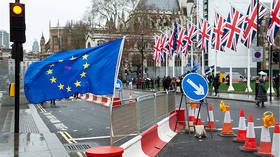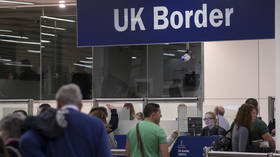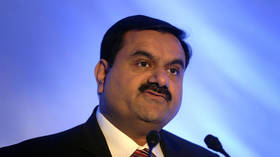Mainstream media tries to paint Britain as a Dis-United Kingdom that’s polarised like the US. The truth is very different

While Americans are constantly at war with each other, Britain’s internal disagreements are far less extreme. So why is the UK media so keen to whip up division?
The British media, and parts of the political class, seem keen to portray the UK as a hideously divided country. When Jeremy Corbyn was leading Labour, he was constantly derided for being wildly left wing, and Boris Johnson’s Tories have been chastised as the ‘most right-wing government’ in a lifetime.
From the rhetoric and the media coverage, an alien who’d just landed in Britain would be forgiven for thinking that at the last election the voters were facing a choice between Leon Trotsky and General Franco. But what, really, is being argued about?
Out of laziness and a lack of language skills, the country Britain mainly chooses to compare itself to is the USA. You see parallels being drawn all the time; the Tories are like the Republicans and Labour mirrors the Democrats. Boris Johnson is a British Donald Trump, because both of them have faintly ridiculous hair and have put it about a bit with the ladies.
Movements are imported from the US like Black Lives Matter and Antifa, and there seems to be a desperate desire to say that Britain has the same problems as America. But this is simply inaccurate; Britain is nothing like America.
Firstly, the most obvious parallel, that the Tories are Republicans and Labour are the Democrats, doesn’t hold up to any scrutiny. The colours don’t even match. The simple fact of the matter is that virtually every member of the House of Commons would be a Democrat if you transported their views over to America.
Also on rt.com Did Twitter’s double standards help foment unrest in Minneapolis?America’s big issues
One only has to look at the fact that many of the big, hot-button issues in the US are not even up for discussion in Britain. There is no debate about guns, abortion, healthcare or the death penalty. Guns = banned, abortion = good, healthcare = state provided, execution = unconscionable; that is the British political cross-party consensus.
In the US, those are positions from the left of the Democratic party, the Bernie Sanders-Alexandria Ocasio-Cortez wing which is viewed as extreme by many average Americans.
The idea of a Tory politician making the argument that people have a right to own a gun is unthinkable, despite there being valid arguments in favour of it. The same is true of the notion of privatising healthcare. For all the talk of the Conservative Party wanting to wreck the National Health Service, it has increased spending on it every year it has been in government.
The argument is never that less should be spent, but rather the parties competing over how much more should be invested and how quickly this should be done.
When it comes to abortion, consider the abuse Jacob Rees-Mogg received for saying that he wasn’t in favour of it because of his Catholic faith, but that he would never seek to change the law. He was effectively painted as advocating for the creation of a state like Gilead in ‘The Handmaid’s Tale’.
The madness of Brexit
Then take Brexit, variously described as ‘the most divisive issue of our times’ and ‘the biggest crisis facing the UK since the war’. The issue has sent politicians and the media across the political spectrum completely mad. Years of airtime and miles of column inches have been devoted to the subject, and the very soul of Britain hung in the balance.
Alliances fractured, and new parties were born and died over the issue. One side believed leaving the European Union would turn Britain into a cold, wet, windy xenophobic island, while the other claimed that remaining would essentially see the country become the equivalent of a German region like Bavaria, in a greater Fourth Reich built on common currency and farming subsidies.
People lost friends, there was march after march – both for and against – two prime ministers were brought down, and Parliament was paralysed for years. And the end result? It might be slightly more difficult for someone to move to London from Warsaw, and there is a small danger of having to fill in a form if you want to fly to Spain.
Tax on a par with China
Another good example of how paper-thin the gaps are in this supposedly divided country is the tax system.
When former Chancellor George Osborne cut the top rate of income tax in the UK from 50 percent to 45 percent, he was portrayed by the right as some kind of post-Thatcherite libertarian buccaneer for no longer taxing ambition. Yet by the left he was painted as a cold-hearted Scrooge McDuck figure, jealously guarding his own wealth and that of his cigar-chomping top hatted friends with their swimming pools full of gold coins.
Want to know which famously right-wing, libertarian, Randian paradise also has a top rate of tax of 45 percent? Communist China. So what was described in the UK as some sort of triumph of Austrian School economics over borderline Marxism in fact just brought the country’s tax system in line with that of the political descendants of Mao Zedong.
The British political class are desperate to make the divisions in UK politics look like a battle equivalent to the Siege of Vienna, when they are nothing of the sort. This is aided and abetted by the mainstream media, who are desperate to drive up ratings.
Also on rt.com It's the final hurrah for Britain's Clap for Carers tonight. Hooray! It's about bloody time this virtue-signalling claptrap endedMedia obsessed with the US
All of this is done by superimposing the lens of American politics over Britain, because the media class has long had a pornographic fascination with events across the pond as if it were some kind of blood sport. It is because of this that the Minnesota riots are receiving blanket coverage, but months of protest by the Gilet Jaunes in Paris barely registered.
While it is obviously wise to keep track of events in the world’s main superpower, to say that Britain’s divisions are as deep is disingenuous, and to pretend they are as significant is plain arrogance.
All of the above is obvious to foreigners, and it would be clear to Brits if they could just drag themselves above the fray.
In comparison to many countries, political divisions in the UK are arguing about angels dancing on the head of a pin. While it might be more exciting to think of Britain as a nation riven by division, I’m afraid the reality is that it is a boringly orthodox country, despite attempts to convince you otherwise.
If you like this story, share it with a friend!
The statements, views and opinions expressed in this column are solely those of the author and do not necessarily represent those of RT.















